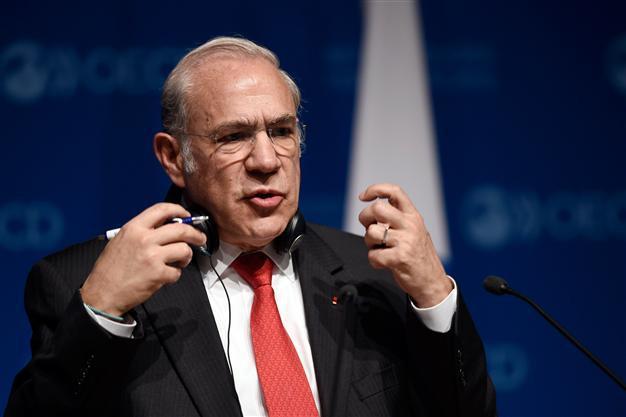OECD calls US dip a blip, but chops world growth forecast
PARIS - Agence France-Presse

A file photo taken on March 12, 2015 shows Organisation for Economic Co-operation and Development (OECD) Secretary General Angel Gurria delivering a speech at the OECD headquarters in Paris. AFP Photo
The OECD on June 3 sharply lowered its global growth forecasts for 2015 and 2016, dragged down partly by a "transitory" shortfall in US performance and by businesses and governments skimping on investment."Global growth is projected to strengthen in the course of 2015 and 2016, but will remain modest relative to the pre-crisis period," the Organisation for Economic Cooperation and Development said.
It predicted the world economy would grow at a rate of 3.1 percent this year, down from the 4.0 percent increase it projected in March.
The growth forecast for next year has been revised downward half a percentage point, from 4.3 to 3.8 percent, with an expectation that the world economy "will strengthen gradually to approach its past (pre-crisis) average pace by late 2016."
The OECD, a policy analysis body grouping 34 advanced economies, slashed its outlook for the United States from 3.1 and 3.0 percent to 2.0 and 2.8 percent for this year and next.
The Paris-based think-tank said the stronger dollar and a brutal North American winter -- which it said caused "transitory disruptions" -- put a brake on growth in the first quarter of 2015, while predicting:
"Activity should regain steam, with aggregate demand propelled by continued employment gains, wealth effects from rising asset prices, and the boost to purchasing power from lower oil prices."
China, too, will grow more slowly than the OECD predicted in March, by two-tenths of a percentage point lower in both years, at 6.8 percent and 6.7 percent in 2015 and 2016.
"Consumption will remain robust" in China, where growth will also be spurred by stepped-up infrastructure investment, it said.
The OECD said that overall, "the economic recovery from the global financial and economic crisis that broke out in 2008 has been unusually weak."
The knock-on effects have included continuing job insecurity, sluggish development in emerging economies and "rising inequality nearly everywhere", the report said.
However, the OECD said it expected growth "to be shared more evenly across regions of the world" in the coming period.
Its outlook for the eurozone was unchanged for this year and slightly rosier for 2016, at 2.1 percent from 2.0 percent thanks to lower oil prices, the weak euro, better financial conditions and fresh stimulus spending.
But unemployment in the eurozone will remain stubborn, declining to a still painful 10.25 percent by the end of next year, the OECD said.
The report chided businesses and governments for what it called "tepid" investment.
"By and large, firms have been unwilling to spend on plant, equipment, technology and services as vigorously as they have done in previous cyclical recoveries," it said.
"Moreover, many governments postponed infrastructure investments as part of fiscal consolidation," it said, with negative effects on employment and wages and therefore consumption.
"On the supply side, sluggish investment has undermined the rate of growth of potential output - the capacity of economies to increase living standards, make good on future obligations to citizens, and repay debt," the report said.
Among global risk factors it cited were new drops in oil prices; failure to reach a "satisfactory" deal between Greece and its creditors; a "hard landing" in China; and a "disorderly exit" from Washington's zero interest rate policy.
It said it expected oil prices to "stabilise above current levels" but well below the $110 per barrel average of the three years preceding last year's precipitous drop.
If sanctions are lifted against Iran, the OECD said the key oil producer could return to full output quickly, prompting others to "lift their supply as well in an attempt to preserve market share."
This, in turn, would loosen the market and cause prices to rebalance at even lower levels, it said.
Greece faces a June 5 deadline to repay more than 300 million euros ($328 million) to the IMF. Overall it needs to repay the global lender some 1.6 billion euros this month, funds it currently lacks.
The OECD urged a further easing of monetary policy in China "to stabilise growth and contain deflationary pressures."
The US Federal Reserve funds rate has remained locked at zero since the end of 2008 as the Fed has sought to help pull the economy back from the Great Recession.
Fed boss Janet Ellen last week said to expect a rate hike "at some point this year" as the economy continues to mend.
















